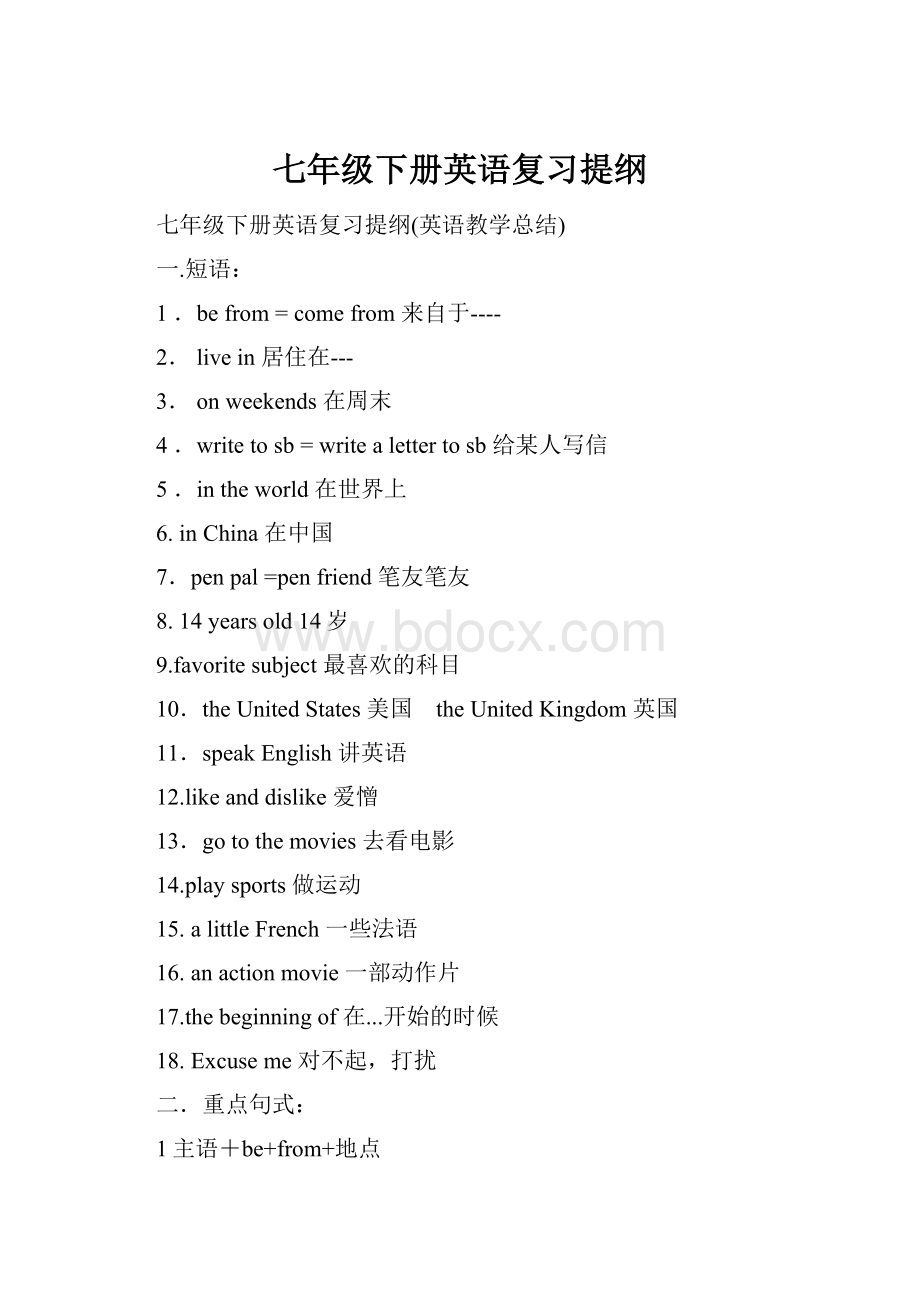七年级下册英语复习提纲.docx
《七年级下册英语复习提纲.docx》由会员分享,可在线阅读,更多相关《七年级下册英语复习提纲.docx(29页珍藏版)》请在冰豆网上搜索。

七年级下册英语复习提纲
七年级下册英语复习提纲(英语教学总结)
一.短语:
1.befrom=comefrom来自于----
2.livein居住在---
3.onweekends在周末
4.writetosb=writealettertosb给某人写信
5.intheworld在世界上
6.inChina在中国
7.penpal=penfriend笔友笔友
8.14yearsold14岁
9.favoritesubject最喜欢的科目
10.theUnitedStates美国 theUnitedKingdom英国
11.speakEnglish讲英语
12.likeanddislike爱憎
13.gotothemovies去看电影
14.playsports做运动
15.alittleFrench一些法语
16.anactionmovie一部动作片
17.thebeginningof在...开始的时候
18.Excuseme对不起,打扰
二.重点句式:
1主语+be+from+地点
Where’syourpenpalfrom?
=Wheredoesyourpenpalfrom
2主语+live/livesin…
Wheredoeshelive?
(对地点提问)
3主语+speak/speaks…
Whatlanguage(s)doeshespeak?
(对语言提问)
4IwantapenpalinChina.
5IcanspeakEnglishandalittleFrench.
一.6Pleasewriteandtellmeaboutyourself.
7Canyouwritetomesoon?
8主语+like/likes+doing…
Ilikegoingtothemovieswithmyfriendsandplayingsports.
9.DoyoulikeEnglishorChinese?
IlikeEnglish.
选择疑问句.不能用yes和no来回答.
三.本单元的国家,人民、语言对应。
1Canada----Canadian----English/French
2France------French------French
3Japan------Japanese----Japanese
4Australia----Australian-----English
5theUnitedStates------American----English
6theUnitedKingdom---British-----Enghish
Unit2Where’sthepostoffice?
一.Askingways:
(问路)
1.Whereis……?
……在哪里?
2.Canyoutellmethewayto……?
你能告诉我去……的路吗?
3.HowcanIgetto……?
我怎样到达……呢?
4.Isthere……nearhere/intheneighborhood?
附近有……吗?
5.Whichisthewayto……?
哪条是去……的路?
二.Showingtheways:
(指路)
1.Gostraightdown/alongthisstreet.沿着这条街一直走。
2.Turnleftatthesecondturning.在第二个路口向左转。
3.Youwillfinditonyourright.你会在你右手边发现它。
三.词组
1.acrossfrom……在……的对面
acrossfromthebank在银行的对面
2.nextto……紧靠……
nexttothesupermarket紧靠超市
3.between……and……在……和……之间
betweentheparkandthezoo在公园和动物园之间
4.infrontof……在……前面
Thereisatreeinfrontoftheclassroom.课室前面有棵树。
inthefrontof……在……(内)的前部
Thereisadeskinthefrontoftheclassroom.课室内的前部有张桌子。
5.behind……在……后面behindmyhouse在我家后面
6.turnleft/right向左/右拐
ontheleft/rightof……在某物的左/右边
ontheleftofourschool在我们学校的左边
onone’sleft/right在某人的左/右边
onmyleft在我左边
7.gostraight一直走
8.down/along……沿着……
(街道down/alongCenterStreet沿着中央街
9.intheneighborhood=nearhere在附近
10welcometo……欢迎来到……
11.take/haveawalk散步
12.thebeginningof…………的开始,前端
atthebeginningof……在……的开始,前端
13.havefun=haveagoodtime=enjoyoneself
玩得开心,过得愉快
我昨天玩得很开心。
Ihadfunyesterday.=Ihadagoodtimeyesterday.=Ienjoyedmyselfyesterday.
14.haveagoodtrip旅途愉快
15.takeataxi坐出租车
16.到达:
getto+地方 gethere/there/home到这/那/家
arrivein+大地方IarriveinBeijing.arriveat+小地方Iarriveatthebank.reach+地方
17.goacross表面横过goacrossthestreet横过马路
gothrough从空间穿过gothroughtheforest穿过树林
18.on+街道的名称。
Eg:
onCenterStreet
at+具体门牌号+街道的名称Eg:
at6CenterStreet
三.句型
(1)、Isthereabanknearhere?
Yes,thereis.It’sonCentreStreet.
No,thereisn’t.
(2)、Where’sthesumpermarket?
It’snexttothelibrary.
(3)、BridgeStreetisagoodplacetohavefun.
(4)、Ihopeyouhaveagoodtrip.
(5)、Ifyouarehungry,youcanbuyfoodintherestaurant.
(6)、Talkawalkthoughthepark..
(7)、enjoy后接名词或动词-ing形式.
Doyouenoy(=like)yourwork?
Doyouenjoy(=like)livinginthecity?
四、日常交际用语
(1)、Istherea….?
句型Eg:
-Excuseme.Isthereahotelintheneighborhood.
-Yes,thereis.No.thereisn’t
(2)、Whereis…?
句型Eg:
-Whereisthepark,please?
-It’sbehindthebank.(肯定回答)
-I’msorryIdon’tknow.(否定回答)
(3)、Whichisthewayto+地点?
句型.例如:
-Whichisthewaytothelibrary.
(4)、HowcanIgetto+地点?
句型.例如:
-HowcanIgettotherestaurant?
(5)、Canyoutellmethewayto+地点?
句型.例
-Canyoutellmethewaytothepostoffice?
(6)、Letmetellyouthewaytomyhouse.
(7)、Justgostraightandturnleft.
五.本单元的反义词、近义词配对
1、new—old2、quiet---busy
3、dirty---clean4、big----small
Unit3Whydoyoulikekoalabears?
一.重点词组
1.wanttodosth.想要做某事
wantsbtodosth想要某做某事
wantsth想要某物
2.Letsbdosth让某人做某事
3.kindof有几分\种类
akindof一种…
4.…yearsold…年龄如:
tenyearsold十岁
5.liketodosth喜欢做某事
likedoingsth
6.playwith…与...一起玩
7.bequiet安静
8.duringtheday在白天
atnight在夜间
9.havealookat..看...
10.one…theother一个...另一个...
二.交际用语
1.Whydoyoulikepandas?
Becausethey’reveryclever.
2.Whydoeshelikekoalas?
Becausethey’rekindofinteresting.
3.Wherearelionsfrom?
TheyarefromSouthAfrica.
4.Whatotheranimalsdoyoulike?
Ilikedogs,too.Why?
Becausethey’refriendlyandclever.
5.Mollylikestoplaywithherfriendsandeatgrass.
6.She’sveryshy.
7.7.HeisfromAustralia.
8.Hesleepsduringtheday,butatnighthegetsupandeatsleaves.
9.Heusuallysleepsandrelaxes20hourseveryday.
10.Let’sseethepandasfirst.
11.They’rekindofinteresting.
12.Whatotheranimalsdoyoulike?
13.Whydoyouwanttoseethelions?
三.重点难点释义
1、kindof有点,稍微
Koalabearsarekindofshy.考拉有点害羞。
kind还有“种类”的意思如:
各种各样的allkindsofWehaveallkindsofbeautifulflowersinourschool.
2、Chinan.中国African.非洲
China和Africa都是专有名词,首字母都应该大写,而且和介词in连用。
TherearemanykindsoftigersinChina.TherearemanykindsofscaryanimalsinAfrica.
3、friendlyadj.友好的,和蔼可亲的
它是名词friend的形容词形式,常常和be动词连用,befriendly。
ThepeopleinChengduareveryfriendly.
4、withprep.跟,同,和…在一起
Iusuallyplaychesswithmyfather.
注意区别与and的用法,and通常用于连接主语或宾语,连接主语时,
如果有I,I通常放在and之后,如:
MyfatherandIusuallyplaychesstogether.
Playwith“和…一起玩耍”“玩…”
Ioftenplaywithmypetdog.Don’tplaywithwater!
5、day和night是一对反义词,day表示白天或一天,night表示夜或夜晚。
通常说intheday,duringtheday,atnight。
Koalabearsoftensleepduringthedayandeatleavesatnight.
6、leafn.叶子
复数形式为:
leaves,类似的变化还有:
wife—wives,wolf—wolves,knife—knives,scarf---scarfs(scarves)等。
7、hourn.小时;点钟hour前边通常加上冠词an表示“一个小时”,即:
anhour。
Thereare24hoursinadayand60minutesinanhour.
8、befrom来自…befrom=comefrom
PandasarefromChina.=PandascomeformChina.
9、meatn.(食用的)肉,为不可数名词,表示“许多”时,使用much来修饰,即:
muchmeatHeeatsmuchmeateveryday.
10、grassn.草,为不可数名词,表示“许多”时,使用much来修饰,即:
muchgrass。
Thereismuchgrassontheplayground.
四.语法知识
特殊疑问句通常以“what”、“who”、“which”、“when”、“where”、“how”、“howold”、“howmany”等开头,对某一具体问题进行提问。
特殊疑问句的基本构成有两种情况:
1.疑问句+一般疑问句结构。
这是最常见的情况。
例如:
What’syourgrandfather’stelephonenumber?
你爷爷的电话号码是多少?
Whoisthatboywithbigeyes?
那个大眼睛的男孩是谁?
Whichseasondoyoulikebest?
你最喜欢哪个季节?
Whenishegoingtoplaythepiano?
他什么时候弹钢琴?
Wheredoeshelive?
他住在哪儿?
Howareyou?
你好吗?
Howoldareyou?
你多大了?
Howmanybrothersandsistersdoyouhave?
你有几个兄弟姐妹?
2.疑问句+陈述句结构。
这时疑问词作主语或修饰主语。
例如:
Whoisondutytoday?
今天谁值日?
Whichmanisyourteacher?
哪位男士是你的老师?
我们学过的What/Howabout+名词/代词+其他?
也是特殊疑问句,它是一种省略结构。
例如:
IlikeEnglish.What/Howaboutyou?
我喜欢英语。
你呢?
Whataboutplayingbasketball?
打篮球怎么样?
Unit4Iwanttobeanactor.
一.短语:
1wanttodosth想要作某事
2givesbsth=givesthtosb
给某人某物/把某物给某人
正确的表示:
giveit/themtosb.
错误的表示:
givesb.it/them
3helpsbdosth帮助某人作某事.
4helpsbwithsth帮助某人谋事
5intheday在白天
6atnight在晚上
7talkwith/tosb和----谈话
8bebusydoingsth忙于做某事
9inahospital在医院
10work/studyhard努力工
11EveningNewspaper晚报
13.shopassistant店员
bankclerk银行职员
14.workwith与。
。
。
一起工作
workhard努力工作
workfor为。
。
。
而工作
workas作为。
。
而工作
15.get..from…从。
。
。
获得。
。
。
正确的表示:
giveit/themtosb.
错误的表示:
givesb.it/them
16.goouttodinners外出吃饭
二.重点句式及注意事项:
1询问职业的特殊疑问词是what;有三种主要句式
①What+is/are+sb?
Eg.Whatisyourmother?
②What+does/do+sb+do?
Eg.Whatdoeshisbrotherdo?
③What+is/are+名词所有格/形容词性物主代词+job?
Eg.whatisyourjob?
2Peoplegivemetheirmoneyorgettheirmoneyfromme.
3SometimesIworkinthedayandsometimesatnight.
4Iliketalkingtopeople.
5Iworklate.I’mverybusywhenpeoplegoouttodinners.
6Wheredoesyoursisterwork?
7thenwehaveajobforyouasawaiter.
8Doyouwanttoworkforamagazine?
Thencomeandworkforusasareporter.
9Doyouliketoworkeveningsandweekends?
10Weareaninternationalschoolforchildrenof5-12.
11.-Whatdo/does+某人+wanttobe?
例:
Whatdoyouwanttobe?
-Iwanttobeateacher.
-Whatdoesshewanttobe?
Shewanttobeanuser.
12.Wheredoesyoursisterwork?
-Sheworksinahospital.
13.Doesheworkinthehospiat
Yes.hedoes/No,hedoesn’t
三.本单元中的名词复数。
1policeman--policemen2womandoctor--womendoctors3thief--thieves4.appletree--appletrees
Unit5I’mwatchingTV
一.现在进行时
Ⅰ现在进行时的用法表示现在(说话瞬间)正在进行或发生的动作
Ⅱ现在进行时时间状语及标志性词
○1now现在○2atthemoment现在
○3look看(后面有明显的“!
”)
○4listen听(后面有明显的“!
”)
Ⅲ现在分词的构成
①一般在动词结尾处加ingEg:
go—goinglook--looking
②以不发音字母e结尾的动词,去e加ing。
Eg:
write—writingclose--closing
③以重读闭音节结尾的动词,如果末尾只有一个辅音字母,应先双写这个字母,再加ing.
Eg:
get—gettingrun—running(swim,run,put,get,sit,begin)
Ⅳ现在进行时的构成
肯定句:
主语+am/is/are+doing+其他+时状.Eg:
Heisdoinghishomeworknow.
否定句:
主语+am/is/are+not+doing+其他+时状.Eg:
Heisnotdoinghishomeworknow.
一般疑问句:
Am/Is/Are+主语+doing+其他+时状?
Eg:
Ishedoinghishomeworknow?
肯定回答:
Yes,主语+am/is/areEgYes,heis.
否定回答:
No,主语+amnot/isn’t/aren’tEg:
No,heisn’t.
二.短语:
1.doone’shomework做某人的作业
dohousework做家务
2.talkonthephone在电话里交谈,
talkabout……谈论……
talkto(with)sb和某人交谈
3.writealetter写信
writealettertosb给某人写信
4.playwith……和……一起玩
5.watchTV 看电视TVshow电视节目
6.waitforsb/sth等待某人/某物
7.someof…………中的一些
8.inthefirstphoto在第一张照片里
inthelastphoto在最后一张照片里
aphotoofone’sfamily 某